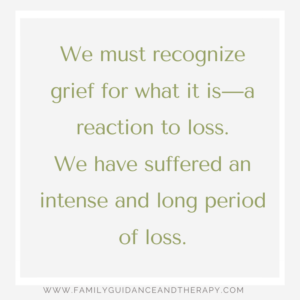Related: What Do We Do When Covid-19 Has Coveted So Much of What We Love?
Hope is beginning to rise as we see promises of our state opening back up, with vaccinations happening, and the number of daily COVID-19 cases and deaths on a major decline.
The onset of hope in this pandemic, however, can unearth a sense of grief. It is difficult to feel uprooted and unbelief in our circumstances and at the same time recognize feelings of grief, so it becomes suppressed.
You might be wondering, why am I feeling this now, and is it healthy to allow feelings of grief?
What Grief Feels Like
Imagine a scene of a movie that depicts grief. Most of us will visualize a person crying and feeling intense hurt and pain. While these are common symptoms of grief, there are many more.
Grieving looks different for each person. It can include feelings of deep sadness. It can affect our sleep and our appetites. It can lead to us feeling restless and having poor concentration. Grief can also cause a mix of feelings such as emptiness, fear, isolation, and vulnerability.
While many of these symptoms are also typical indicators of depression, grief is something we heal from as time goes by. We do not consider grief dangerous, as we do a diagnosis of clinical depression which requires treatment, such as talk therapy, to address our emotional state.
Grieving is part of the Healing Process
In the wake of coronavirus, we can expect healing to take time. Grieving is an important part of our healing.
We were, and still are, in the midst of loss. Some of us lost loved ones. Some of us lost financial security. We also lost circumstances in our community as we knew it…we hid behind masks and Plexiglass walls. We stood 6 feet away from others. We stopped gathering in groups. Our healthy mental outlets and our social world came to a halt. We will not forget this any time soon, and because of this long-term jumbling up of what did feel normal over a year ago, we have much healing to do.
As our communities begin to open back up, it is okay to feel a sense of doubt, fear, or worry that the lockdown and effects of the pandemic might hit us all again. Our sense of security, a human need that all of us have, got lost in the pandemic.
We must recognize grief for what it is—a reaction to loss.
We have suffered an intense and long period of loss.
Healing Requires Kindness, Time, and Support
Be kind to yourself and others.
One of the worst things that we can do is sweep feelings that accompany grief under the rug. Allowing ourselves to face our grief, without any pressure to “be strong” is a huge step towards healing.
We need to give ourselves and others space and time to express what we are feeling…to recognize what happened to all of us and to catch our breath (process our thoughts and memories). Allowing grief is much more than okay.
Remember to take care of yourself as you grieve. Be kind to you! Take each day as it comes and engage in self-care.
You might try looking at the world as if through the eyes of a child. What beauty and new things are you seeing today? What are you doing today for the very first time (or at least the first time in more than a year)? Share your inspirations as an encouragement to others. Research shows that the more we support others, the healthier we are ourselves.
Erick Erikson’s words are wise and fitting for our healing from this crazy pandemic, “Life doesn’t make any sense without interdependence. We need each other, and the sooner we learn that the better for us all.” The “better” part of this quote speaks to healing!
Reach Out for Support
We need each other. We need to release what troubles us. We know that grief is a part of life, but that does not make it any easier. It is normal to experience a variety of feelings when dealing with a loss--and it is ok to reach out for help.
Sometimes a little support can go a long way.
Do you need help today? Make an appointment now.

